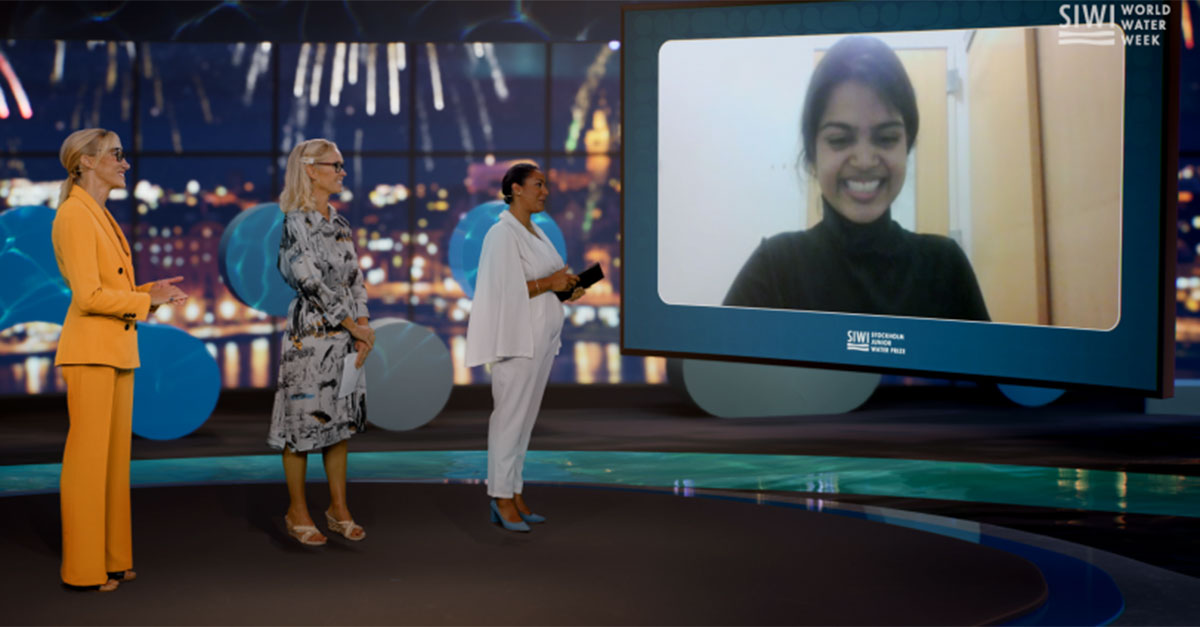
On August 24th the Stockholm International Water Institute (SIWI) announced Eshani Jha from Lynbrook High School in San José as the 2021 winner of the Stockholm Junior Water prize for her research project on developing affordable water filters.
Eshani Jha
“I am honored to receive this prize, particularly with so many excellent contributions from around the world. I hope we can work together in the years to come, for a better water world. We really are the future of water-related science,” said Eshani. “I see great potential in targeting other contaminants (with the filter). My ambition is that this should be a one-stop water filter.”
The winner was announced by HRH Crown Princess Victoria of Sweden, the Prize’s Official Patron, who also expressed great admiration for all the finalists.
Eshani will receive a blue crystal award, a handmade diploma, and a cash prize of $15,000, awarded by the Stockholm International Water Institute. Eshani’s school, Lynbrook High School, also receives a $5,000 donation as part of her international recognition.
“We’re so proud of Eshani for winning the Stockholm Junior Water Prize, more importantly, her invention will save lives by providing clean water,” said Arvind Akela, President of the California Water Environment Association (CWEA) and Engineering & Environmental Services Director for Silicon Valley Clean Water. “She represents the very best of the California water profession – innovative, creative and dedicated to protecting public health. She’s an inspiration for our next generation.”
Eshani’s technology was first recognized by CWEA during our California Stockholm Junior Water Prize competition held in the spring. Out of 21 California high schoolers who applied, Eshani’s research project was selected by a panel of California engineering professors and CWEA Board members during a virtual event.
She went on to represent California at the national level at a competition hosted by the Water Environment Federation (WEF). Students from 43 states and the U.S. Armed Forces Abroad competed in the national finals during a virtual event. The judges selected her project as the winner of the American competition and she went on to the SIWI international competition where 44 finalists from 32 countries competed for this year’s top prize.
Eshani’s water research project, titled “Thiol Functionalized and Manganese Dioxide Doped Biochar for the Removal of Toxic Organic and Inorganic Contaminants from Water,” impressed the international SIWI judging panel with its global applicability, novel use of cheap and widely available material for filtering water, and its potential for scalability as a viable, impactful product.
Her research was all completed during her high school years and focused on how to remove contaminants from our freshwater in a simple and cost-effective way. The process involves replacing active carbon with biochar for use in efficient and cheap water filters. The device has been patented.
Her invention targets certain classes of contaminants, particularly pesticides, emerging contaminants, and heavy metals. She explains that she has enhanced the biochar’s ability to act like a sponge for these contaminants, creating a ‘super sponge’.
Eshani shared the inspiration for her research project during a prior interview with the Regeneron STS awards competition.
“On a trip to India the summer before seventh grade, I visited the slums in my home state of Bihar, and I saw these kids with missing limbs and deformities and puckered skin. I was shocked, I’ve never seen anything like it before. I asked my relatives why so many people are afflicted this way, and they told me it was because they are drinking contaminated water. Seeing those people who were affected by water contamination up close was what motivated me to start my research into water filters and to continue it. I think that will motivate me in any field I pursue, knowing that my research can help,” said Eshani.
The SIWI judges panel noted water contamination is a growing problem around the world and that device is potentially scalable to global use, with the added benefit of localized manufacturing.
Eshani now begins her first semester at the UC Berkeley and looks forward to large-scale testing of her patented prototype.
The Stockholm Junior Water Prize has been organized every year since 1997 by the Stockholm International Water Institute, SIWI, with Xylem as Founding Partner. This year the event was held online.
“Stockholm Junior Water Prize celebrates young people’s determination to be part of a better future. The passion and ingenuity that all participants show is truly inspiring and an important contribution to the global water world,” said Torgny Holmgren, Executive Director at Stockholm International Water Institute.
“These winners are part of a global movement,” said Patrick Decker, Xylem’s CEO. “We’re so inspired by them – and all 125,000 entrants in 25 years of the Stockholm Junior Water Prize. A generation of young people, motivated to solve society’s biggest water challenges, can and are changing the world. We’re so proud to champion their innovation by sponsoring this great Prize.”
Learn how high school students can apply for the California Stockholm Junior Water Prize on the CWEA website >
Applications are due in mid-April each year. The California competition is open to all high school students in grades 9-12 who have reached the age of 15 by August 1st of the competition year, and have conducted a water-science research project.
A panel of CWEA judges and engineering professors select a winner to move on to the national competition hosted by WEF. CWEA provides a cash prize for the top three students. $500 for first place; $300 for second place and $100 for third place. CWEA also covers the expenses for the first-place student to travel to the WEF competition.